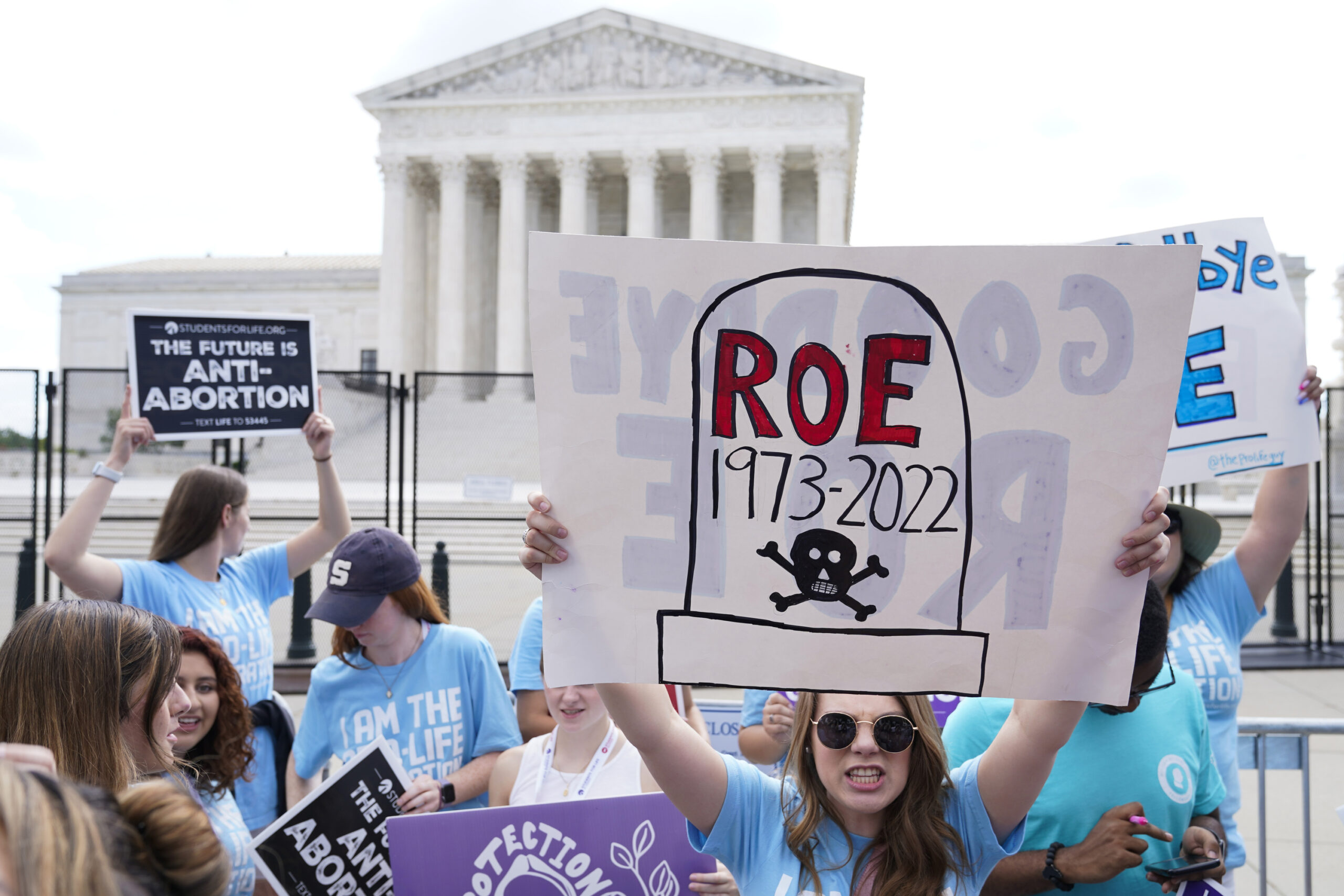

As supporters from across the country gather in the nation’s capital for the 51st annual March for Life on Friday, abortion is becoming a more powerful force in politics than it has been in a generation.
This year’s march, with the theme of “with every woman, for every child,” will take place against the backdrop of a presidential election in which abortion will play a major role, several abortion initiatives on state ballots this year after recent losses for the anti-abortion side — and the question of how supporters of the movement can advance their goal of protecting the unborn.
Several abortion-related cases are also set to be decided by the Supreme Court.
Since Dobbs v. Jackson Women’s Health Organization overturned Roe v Wade, abortion has been a political hot potato on the conservative side of the aisle, with many conservatives in disagreement over how best to tackle the issue. Abortion also appeared to help secure victories for liberals who have outperformed expectations in the past two election cycles while messaging almost entirely on abortion.
“This is an issue where Democrats continue to have an advantage. I thought it was telling that in the entrance poll of the Iowa Republican caucus, just 61% of participants among a conservative electorate said they supported a national ban on all or most abortions, while 35% didn’t,” Kyle Kondik, managing editor of Sabato’s Crystal Ball at the University of Virginia Center for Politics, told the Washington Examiner. “I think that shows how abortion divides Republicans much more than Democrats, and that has shown up in these ballot issue votes.”
“That doesn’t mean abortion is a cure-all for the Democrats’ problems, as Republicans have their own advantages on other issues,” Kondik added.
Each Republican presidential candidate has a different viewpoint on how to address abortion, and none have committed to a national restriction, such as banning the procedure after 15 weeks of gestation, which is the standard set by influential groups like SBA Pro-Life America.
Presidential election
Kondik predicts that “if nominated, [former President Donald] Trump is probably going to muddle his own position on abortion, while Democrats are going to point to him as the architect of the Dobbs decision, given that his appointees were crucial in deciding it.”
While Trump became the first sitting president to speak at the March for Life in 2020 during his reelection bid, he recently painted a more moderate picture of his views at a Fox News town hall, saying, “I happen to be for the exceptions, like Ronald Reagan, with the life of the mother, rape, incest,” adding, “you have to win elections.”
Trump, who said he was “very pro-choice” in the 1990s, also took aim at Republican presidential primary rival Gov. Ron DeSantis (R-FL) for signing what’s known as a heartbeat bill, or legislation that aims to restrict abortion at about six weeks gestation.
“If you talk five or six weeks, a lot of women don’t know they’re pregnant,” Trump said, highlighting the Democrats’ “radical” position on the issue.
“I want to get something where people are happy. This has been tearing our country apart for 50 years,” Trump added.
Friday’s march will not feature in-person speeches from any of the presidential candidates, although former Gov. Nikki Haley (R-SC) and DeSantis have sent in short pretaped messages. The event will include addresses from conservative political leaders, including House Speaker Mike Johnson (R-LA) and Rep. Chris Smith (R-NJ), who co-chairs the House Pro-Life Caucus.
State level
Because of electoral hardships, both with candidates and ballot initiatives, conservatives have been disappointed by their inability to capitalize quickly on the overturn of Roe.
Republicans have been forced back to the drawing board to weigh how they can message and win on the issue, and Gov. Glenn Youngkin’s (R-VA) strategy in last year’s Virginia legislative elections appears to have nearly cracked the code.
As opposed to having Republican candidates attempt to sidestep the issue, which has earned them the ire of anti-abortion advocates and others, Youngkin decided to take on the issue directly — and he effectively unified his party’s candidates around a 15-week restriction with exceptions for rape, incest, and protecting the life of the mother.
Using that strategy, Republicans in 2023 won in eight districts that voted for President Joe Biden in 2020, and they won most of the swing districts as well. The partisan swing of redistricting in Virginia was too much to overcome, however, and both General Assembly chambers fell under Democratic control.
Realizing changes will not happen immediately, especially given the context of half a century of successful messaging from liberals who support legal abortion, conservatives and advocates alike are coming to the conclusion that deploying a longer-term strategy to change America’s cultural orientation toward abortion while taking pragmatic wins where they come might be more fruitful.
“Human rights battles are not won overnight. We must be unwavering and persistent in order undo the abortion industry’s 50-year political monopoly and deeply rooted lies that have legitimized ending the lives of 63 million babies in the womb,” Kelsey Pritchard, SBA Pro-Life America state public affairs director, told the Washington Examiner. “With state protections for nearly 30,000 babies annually at stake in 2024 ballot measure fights, we must engage in these fights now by aggressively raising money and vocally standing in opposition.”
With at least 11 states having the potential to see an abortion amendment on their ballot this fall, opposition groups are forming to combat them. Last year in Ohio, a majority of voters approved an amendment that is being used to supersede the Buckeye State’s heartbeat bill, as well as take away parental consent laws for certain medical interventions.
Taking lessons learned from the Ohio loss, organizations are gearing up for a funding and messaging battle in other states this cycle.
Missouri, which has some of the strictest prohibitions on abortion in the country, is one such state that will likely see the issue on its ballot.
On Tuesday, a coalition called Missouri Stands with Women formed to oppose the bill, and the group appears convinces of its ability to buck the trend of ballot initiative losses seen since 2022.
“We are confident our coalition, working together with other pro-life leaders and organizations across the state, will have the financial resources, grassroots strength, and partnerships necessary to ensure out-of-state extremists are not allowed to place unregulated, taxpayer-funded abortions up to the moment of birth in our state’s constitution,” Stephanie Bell, spokeswoman for the group, told the Washington Examiner.
Supreme Court
Supreme Court decisions tangential to the abortion debate also loom large over this year’s March for Life — and possibly the 2024 election season.
In December, the high court agreed to hear a case brought by anti-abortion doctors on the Food and Drug Administration’s approval of the common abortion drug mifepristone.
Mifepristone, which works by cutting the progesterone supply to the developing fetus, was approved by the FDA in 2000 for chemical abortions up to eight weeks of pregnancy. In 2016, the FDA loosened the restrictions on the pill to a 10-week gestational limit and began requiring less physician oversight of complications.
During the coronavirus pandemic, the agency permanently waived requirements for prospective abortion patients to visit a doctor in person before obtaining a mifepristone prescription, enabling the pills to be sold by mail. Now, studies indicate that millions of women are stockpiling abortion pills in the event that the Supreme Court reverses the FDA’s regulatory authority.
The Supreme Court is also set to hear a case in June on whether state abortion bans interfere with federal law requiring physicians to perform emergency medical treatment.
CLICK HERE TO READ MORE FROM THE WASHINGTON EXAMINER
The Biden administration in August 2022 sued the state of Idaho for its near-total abortion ban, saying it is in violation of the Emergency Medical Treatment and Labor Act not to allow for emergency abortion procedures. A similar case against the Texas abortion law is working its way through the court system as well.
Anti-abortion physicians in both cases contend, however, that elective abortions are not medical emergencies and that healthcare providers have the responsibility to attempt to save both the life of the mother and the child when possible. Healthcare providers on both sides of the abortion debate acknowledge that ectopic pregnancy and miscarriage care are categorically different from elective abortions.







